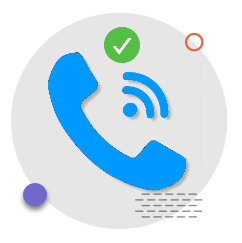
Insurance companies save and distribute many documents as PDFs for the sake of ease and consistency, but PDFs are often inaccessible to clients who use assistive technology. People with disabilities often use assistive technology like screen readers or refreshable Braille displays, but PDFs are frequently inaccessible when they don’t include digital tags. That means people with disabilities may not be able to access necessary documents to keep their bills and benefits organized and up to date. With over 25% of the population having some disability, accessibility is vital to the success of your clients, your employees, and your business. 2024 updates to Section 504 make digital accessibility even more necessary.
Documents that need to be accessible:
Insurance companies provide their clients with important health and financial information that they need to be able to read and understand. When a person is unable to access those documents it can lead to delays or barriers to coverage and necessary healthcare.
PDFs can include:
- Explanations of Benefits
- Billing statements
- Provider lists
- Policy manuals
- Coverage information
Which laws apply?
Accessibility is legally required whether you’re a public or private company. It’s necessary to provide the best service for your clients.
If you receive federal funding through Medicare or Medicaid
If your insurance company provides federally funded services like Medicare or Medicaid, Section 508 and Section 504 of the Rehabilitation Act apply to you. Section 508 requires that federal government websites and all files on websites, which most often include PDFs, be accessible to both employees and the general public who may access them. Section 504 requires organizations that receive federal funding make their resources accessible as well. Your documents must be accessible to everyone or you may lose your contracts and funding from government agencies.
If you’re privately funded
If your insurance company does not receive federal funding, it is likely considered a place of public accommodation, which is covered by the Americans with Disabilities Act (ADA). According to district court rulings, which were upheld by the Supreme Court, your website and all the files it contains need to be accessible to both employees and customers.
2024 Updates to Section 504
In May 2024 the U.S. Department of Health and Human Services (HHS) finalized their Rule “Nondiscrimination on the Basis of Disability in Programs or Activities Receiving Federal Financial Assistance.” Their press release includes this statement: “Reflecting over fifty years of advocacy by the disability community, the Section 504 Final Rule clarifies and strengthens civil rights protections for people with disabilities, addresses discrimination in medical treatment, adds enforceable standards for accessible medical diagnostic equipment, and ensures accessible web content and mobile apps. The rule advances the promise of the Rehabilitation Act and helps protect people with disabilities from experiencing discrimination in any program or activity receiving funding from HHS because of their disability.”
A fact sheet was provided outlining the changes to Section 504. The following items address digital accessibility for healthcare:
- “Web and mobile accessibility. As technology continues to provide new ways to deliver health and human services programs and activities, it is vital to ensure that those methods are readily accessible to and usable by individuals with disabilities. The final rule defines what accessibility means for websites and mobile applications and requires compliance with specific technical standards, the Web Content Accessibility Guidelines (WCAG) 2.1 AA. This approach aligns with the standards recently published by the Department of Justice under Title II of the Americans with Disabilities Act.”
- “Communications. Recipients must ensure effective communications with individuals with hearing, vision, and speech disabilities through the provision of auxiliary aids and services. Such aids and services may include qualified interpreters or readers, assistive listening devices or systems, text telephones, captioning, and information in Braille, large print, or electronically for use with a computer screen-reading program.”
Results of Noncompliance
Your clients and employees- as many as 25% of them- won’t be able to access important healthcare and financial documents.“Think about your own daily life and how much you use the internet,” said Chris Danielsen, the Director of Public Relations at the National Federation of the Blind, and a blind person himself. “And then imagine almost every day you encountered something that you literally could not do.”
Inaccessibility will cost you money
Frustrated users might just navigate away from your site and take their business elsewhere, but many may recognize your oversight as an unwillingness to comply with legally mandated standards and file a lawsuit to enforce those laws and protect their rights. If there are a number of other clients who also are unable to access important documents you might be faced with a class-action ADA lawsuit. Whether there’s one plaintiff or a group, litigation is expensive.
Frustrated website visitors will also seek another insurance company. They may tell their family that your insurance company doesn’t consider their needs, and out of support for their loved one, they may also seek insurance services elsewhere. Once again, you lose money.
Inaccessibility leads to litigation
In 2014, WellPoint Health Networks, Inc., now called Anthem, faced just such a lawsuit for failing to make their digital resources accessible. Plaintiffs Steven Mendelsohn and Sam Chen are both California residents and members of Anthem Blue Cross, a WellPoint company. They both have visual impairments and found the company’s website to be inaccessible. They filed a lawsuit and were able to enter into negotiations, after which Wellpointsigned an “accessibility settlement agreement” outlining how the company planned to comply with the Web Content Accessibility Guidelines (WCAG) 2.0. WCAG is a widely recognized set of standards that ensures accessibility when implemented correctly.
Avoiding litigation and reaching every client:
PDF accessibility doesn’t have to be prohibitively time-consuming. Content creators can easily and quickly make individually-produced PDFs accessible with an easy-to-use PDF accessibility tool like Equidox. That might include individual documents such as lists of covered medical supplies, informational brochures about preventative treatments, or booklets of in-network providers, which are quickly and easily remediated in-house with a PDF remediation software such as Equidox.
Equidox PDF accessibility software uses AI-powered Smart Detection Tools to instantly detect text fields as well as images, lists, and tables. Then, easy editing features allow users to easily adjust these “zones” to apply accurate digital tags that can be read by assistive technology. The process is so easy that any content creator can quickly learn it and can be responsible for the accessibility of their own content.
No time or manpower to remediate in-house? Equidox also offers PDF accessibility services to remediate documents for you.
Other PDFs may include mass-produced form documents with differing information for each client, including explanations of benefits and billing statements. High-volume PDFs that are formatted in exactly the same way but with varying data in given fields can be instantly made accessible using a custom-built, high-volume integrated solution like the one offered by Equidox.
Be Proactive
If you haven’t approached PDF accessibility yet, the time is now to start. Be proactive and make your website and everything on it accessible so your clients and employees can access necessary information. Equidox can help make the process fast and easy for any content creators so every document can be accessible from their creation.
Nina Overdorff
Nina comes to Equidox with years of sales and marketing experience from a variety of industries and holds a BS in Language Arts Education. Nina has a passion for words, storytelling, and information, which she believes everyone should have access to regardless of ability. After spending time as a teacher with a blind student, she became much more aware of the limitations and abilities of web accessibility, and how essential it is to those experiencing disabilities. “Being able to access information equally ensures that everyone has an equal opportunity for education, employment, and success in life.”

Let’s talk!
Speak with an expert to learn how Equidox solutions make PDF accessibility easy.